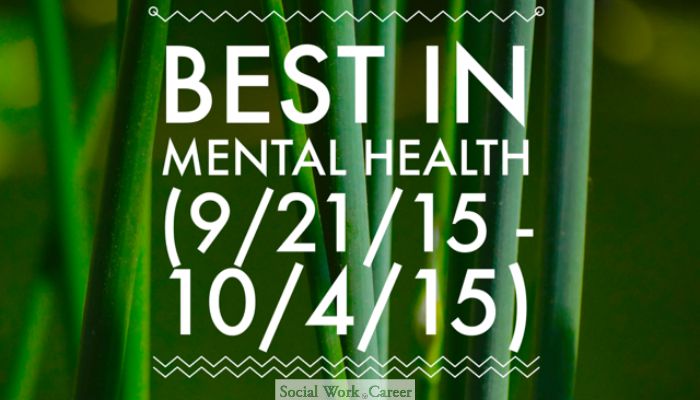Below is a round-up of some of the latest news in mental health (and more)!
This week’s wrap-up has 5 main themes:
- Advocacy/Cultural Sensitivity
- Technology and Mental Health
- Therapy/Relationships
- Self-Care
- Career/Non-Profit
Advocacy/Cultural Sensitivity
- Asylum Discourse in New Zealand: Moral Panic and a Culture of Indifference – Bogen & Marlowe share their paper in which they discuss how the social work profession may address the collusion/silence with oppressive asylum policies via stronger advocacy and action.
- Baltimore & Beyond: #MacroSW Twitter Chat – archive of chat and summary of resources shared before and during chat.
- Breaking the Cycle of Poverty Online – Martin shares some online resources that are available to help level the playing field for low-income college students (and first generation low income students) such as Students Rising Above and College2Careers Hub (SRA Hub).
- CRISP Launches #YSocialWork – Cohen shares how CRISP launched #YSocialWork as a membership-based organization for social work students and young professionals to develop emerging social work leaders.
- Co-opting Fear to Influence Policy Making and Political Discourse – to combat discrimination of vulnerable individuals and groups among fearful orecticists and others, Dr Wright recommends individual-based interactions such as story sharing and project-based civic work.
- “Ex-Gay”: Conversion Therapy Movement Puts Lives at Risk – undermining efforts of movements that stress tolerance and equality for LGBTQ individuals, conversion therapy is still a common practice.
- Globally Connected Classrooms: Partnership, Technology, and Human Rights [podcast] – Méndez López and Dr. Critelli talk about teaching via technology “Disability and Human Rights from the Perspective of Law and Social Work.”
- Inequality for All: Student-Focused #MacroSW Twitter Chat – Jimmy Young and Laurel Hitchcock designed an assignment for social work students that involves joining a live Twitter chat with other social workers around the country to talk about important economic justice issues.
- Mental Health Stigma Varies Between Disorders – as Barton talks about/faces her different mental health disorders, she has discovered that she can feel more comfortable asking for help for one vs. another.
- Professor Cabassa’s Culturally Sensitive “Fotonovela” – a comic-book style information pamphlet that is popular in Hispanic and Latino culture is to be tested in a study to see if it is successful in increasing patient engagement among Hispanics.
- Redefining the Role of Business to Achieve the UN Sustainable Development Goals – Hawkins describes the fight for a more prosperous, sustainable and equitable world and how business holds the key to fulfilling the United Nations’ aspirational goals.
- Removing Stigma In The Aftermath Of Sexual Abuse – Clancy explains the intense betrayal and shame victims feel as they try to understand why/how someone they trusted could have abused them and how to help reduce the stigma they feel.
- Review of the WrightsLaw Special Education Law & Advocacy Workshop – to properly advocate on behalf of disabled students, Thompson suggests that more of us become familiar with the laws that were established to protect their rights to a free and appropriate education.
Technology and Mental Health
- Connecting Twitter Communities… – Erreger is proposing that some twitter communities/chats meet via hastags to better understand and collaborate on common interests. Join Kristie Holmes and Social Workers on the Hill -Live from CSWE – #2015APM Oct 17 at 2:45PM EST.
- Digital Citizenship Summit – archive of #DigCitSummit centered around having a healthy relationship with technology Digital Citizenship Best Practices for College and Career Ready Students
- the morning after we all became social media gurus – Bonnie raises thoughtful questions about the use of social media in higher education such as how best to measure and frame the benefits of digital and networked scholarship to others in the academy.
- Should the Government Provide Infrastructure For a Health Data Highway? – Meyer proposes a new infrastructure to facilitate getting healthcare information from point A to point B; this would enable a learning healthcare system.
- SMS text messaging interventions for healthy behavior change – while these interventions have a positive, albeit small, effect on healthy behavior change, Maynard notes that the authors only compared SMS intervention to no intervention at all.
- What types of video games improve brain function? – Compared to passive learning, action video games appear to be particularly promising in terms of improving attention skills, brain processing, and cognitive functions.
- Zero Suicide Toolkit – H/T to Erreger; this suicide prevention toolkit requires a system-wide approach from both health and behavioral care systems to improve outcomes and close gaps.
Therapy/Relationships
- Are You Re-Enacting These Trauma Patterns in Therapy? – Staggs describes 4 different ways that trauma may be re-enacted within the therapeutic relationship such as exploiter/exploited, allies/enemies, aggressor/attacked and rescuer/rescued.
- Collaborating Across Sectors to Grow Healthy Kids – while the educational system is usually considered to be separate from the health care system, Plough demonstrates how cross-sector collaborations can provide children with a strong beginning.
- Does knowing high-status people help or hurt? – the socioeconomic status of people within a personal network have mixed effects on an individual’s mental health.
- The economics of behavior [podcast] – Malcolm interviews Richard Thaler, one of the founding fathers of behavioral economics on misbehavior; one of the ways to encourage people to make better decisions is to make the process of making the good decision easier, a default.
- Empty crib, broken heart – Bray raises some of the infertility and reproductive issues that individuals may go through so that we are better prepared when one of our clients presents with some of these.
- Focusing on Long-Term Weight Loss: The Art of the Possible – to reverse trend that most obese people who lose weight gain it back, Beck Busis recommends making only reasonable and maintainable changes and illustrates how with case examples.
- Help and Hope Through Suicide Prevention – Wakefield shares valuable resources including the warning signs of suicide, a video in which Terry, David and Jordan share their stories of how they made the journey from a suicide attempt to recovery and more.
- How to Break Into an Adult Clique – like-minded individuals often form social groups to discuss interests, but Dr Hanks guides you on how to join a desired network such as directly asking, getting to know one person at a time and more.
- How To Make Conversation – Borgman interviews Kabaki-Sisto about The I Can Have Conversations With You App which ties all the conversation components together so that a child (and adult) with autism do not miss key components.
- How Mindfulness Improves Your Brain and Relationships – Dr Greenberg explains how mindfulness positively impacts brain integration, sense of self, impulse control, regulation of attention and emotion (and thus, in turn your relationships with others).
- ICD-10-CM and the Panic that Numbers Ensue – Therapydoc explains some of the mayhem that arises with the ICD-10-CM or the International Classification of Diseases requirements (also feel free to look at: Confused by DSM-5? Get Up to Speed!).
- PTSD and Brain Science: Why Education is Key in Recovery – Rosenthal stresses the importance of clients having their symptoms acknowledged/validated, and the need for brain-specific processes that facilitate healing.
- SBIRT: Identifying and managing risky substance use – DeSalle and Agley Screening describe brief intervention and referral to treatment (SBIRT), whereby you provide clinically tested questions to determine individuals’ level of substance use and then match them with the appropriate amount of care.
- Seeking help for mental health problems: Change the culture for providers – Fortenberry calls for a change in medical practice to reduce the stigma and make it easier for people to ask for help for mental health problems.
- Self Reflection – Malcolm explores the concepts of transference/counter-transference, self-disclosure and the power Dynamic between therapist and client.
- The Sticking Place – Crawford describes the immense courage clients have in order to endure all the anxiety and pain they end up feeling when they decide to reveal vulnerabilities, examine failures/weaknesses and more.
Self-Care
- 10 Ways to Uplift & Inspire Your Kids, Family, & Self! – to boost your creativity (and happiness), Dr Hibbert suggests you acknowledge your creativity, believe in yourself, practice nurturing your creativity each day and more.
- Aid to Zen: A – Aidland and Aid to Zen: B – Booze – Pigni tells you what aid is all about and stresses the need for true self-care, but shares the tragedy that in humanitarian circles some people mistakenly equate drinking with self-care.
- Art Journaling with kids – Maricle describes 8 art journaling prompts (such as fingerprint faces and beautiful “mistakes”) to help you create a shared journal with your child.
- How do you treat your art? – Mitchell proposes relating to our art in a loving way so as to strengthen our ability to have loving relationships (for ex: How would you respond to what your art is saying if your art was a dear friend?)
Career/NonProfit
- Back to School 2015 with Social Work Tech – to start the season off right, Ignacio suggests updating your linkedin profile, making relationships, engaging in self care and more.
- Financial Planning in Private Practice – Higdon interviews Storjohann about the common misteps therapists make in private practice and what they can do to ensure a stable financial future.
- How Do YOU Stand Out? Exploring Your Social Work Brand (#YourSWBrand) – Battista-Frazee explains what a personal brand is and how it is important for social workers to employ a thoughtful approach towards their personal brand.
- How do you stop social workers leaving the profession? – Baginsky notes the high churn of social workers in England and stresses the need for employers to demonstrate to social workers that they are valued as professionals both in terms of how they are treated and rewarded.
- Know Your Worth [podcast] – Sanok interviews Muirhead on how to never run out of work, why a specialty always works, and how to determine what you should do yourself versus what you need to recruit support for.
- Overcome Your Reluctance to Using Video – Austin and Power discuss on blab how talking via video/blab/periscope enables you to build trust and a connection with your audience. Making a video for your site is one way to stand out online.
- Using Video To Promote Your Practice – Varghese interviews Segismundo about how best to use video; tips include they should be short (about 2 minutes), have strong content and “hook,” or strongest part of the video should be at the 8-second mark.
Like this post? Please share it!





